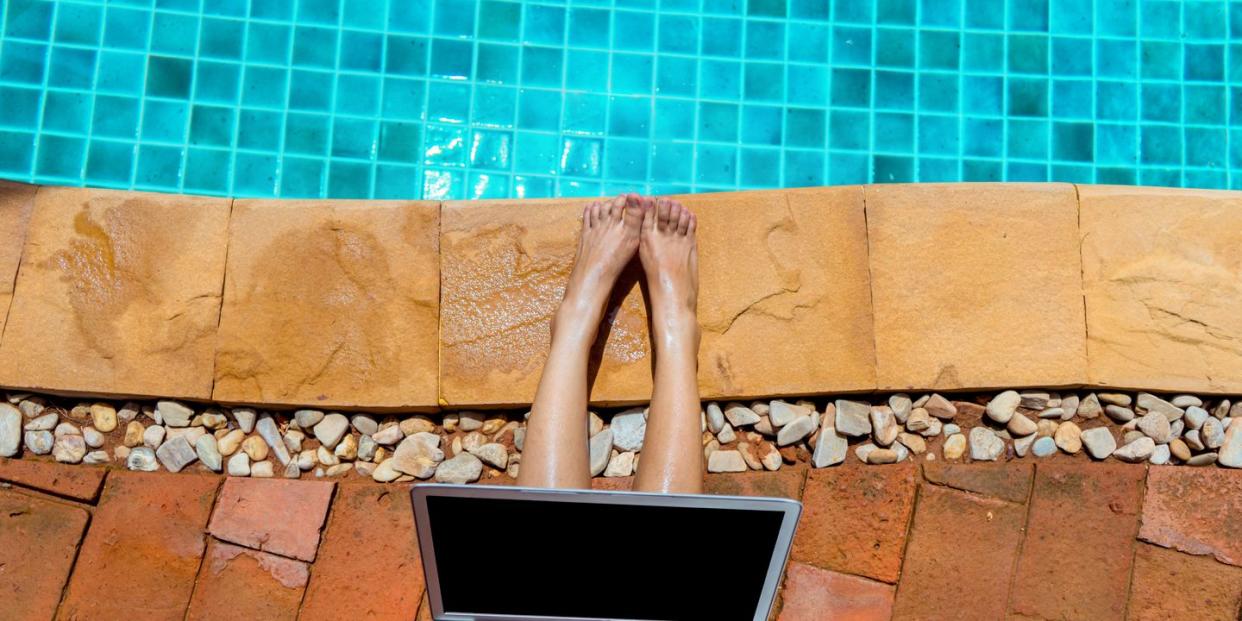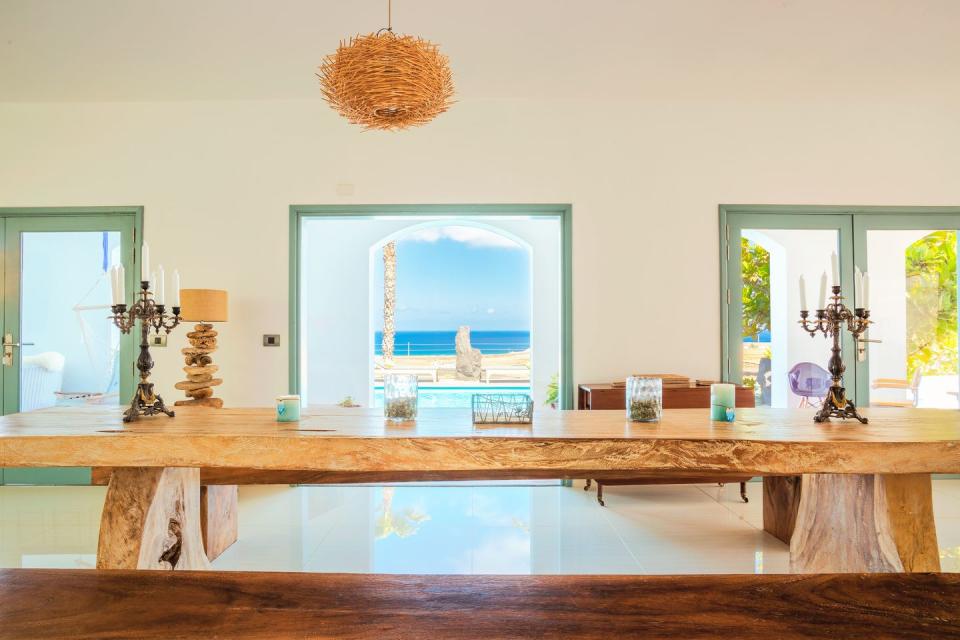When life, work and travel collide: working remotely abroad is here to stay

This year, millions of us started working from home for the first time. Companies around the world, big and small, realised that their staff could be just as productive, if not more so, if they worked remotely. Many established a better work-life balance and enjoyed the freedom of not having to get the 7.30 train into the office every day. Great swathes of people left London to move to rural destinations that would have required torturous commutes before.
People were given a taste of a new way to live. Work became more flexible, and the idea of offices with their florescent lights and soul-destroying cubicles now feels increasingly dated and unnecessarily costly. As the vaccine is dished out to the elderly and vulnerable, the idea of a post-pandemic world no longer feels like pie in the sky. One thing that looks increasingly likely is that, when this is all over, the office will not be the same again. Our concept of where and how we work has forever changed - for the better.
Once restrictions began to ease last summer, a number of those working from home decided to maximise their situation and temporarily relocate to warmer, more idyllic locales. I was one of them, moving from my flatshare in London to an Airbnb in Sicily where I worked from a sun-baked courtyard for six weeks. I did the same hours, just in a different location better suited to my default setting.
We may be housebound right now, but the travel industry has noticed an opportunity in the flexibility afforded by this new way of working – and the changes are expected to last far beyond the end of the pandemic. In October last year, Airbnb reported that over half (51%) of UK office workers have thought about living elsewhere during or post-lockdown and that searches for homes with WiFi increased by 10% in September 2020 compared to September 2019, showing the importance of connectivity when looking for a place to work remotely. Airbnb hosts began offering increased discounts for longer stays. “The pandemic has prompted a real shift in consumer behaviour towards travel, and part of this change has been to normalise the idea of working from anywhere,” said Emmanuel Marill, Airbnb’s regional director of Europe, Middle East and Africa. “As businesses have adjusted to remote working, many of the barriers to remote working have been swept away and people are embracing the idea that they can live and work anywhere.”

Entrepreneur Tom Brooks was working from his home in London when he was invited to work from the French chateau of an investor. During his stay, he and his business partner realised that the way in which they were working – in a beautiful location with great WiFi – was likely to have a broader appeal, so they set up Yon Living, a mix of overseas residencies in picturesque locations where remote workers can come together. The idea is to offer professionals a sun-drenched location, from Sicily to Morocco, to work from, as well as a sense of community that is missed from the office. “There’s a new demographic coming onto the market,” he tells me. “Traditionally, you had your digital nomad that did this already and now you have what I’m calling promads, a professional worker that still has to be connected online with a Zoom call at 9am on Monday morning so they can’t just float around the world. but also they don’t need to be in London anymore.”
Yon’s guests are predominately in their thirties and forties and have established careers and professional commitments. They aren’t interested in a youth hostel environment; they expect ensuites, elevated interiors, pools and high speed WiFi. Brook says the average stay at Yon properties is two and a half weeks. Guests have their own rooms, but share giant kitchens and ample workspace. “Previously, you had three separate bubbles – live, travel, work,” he comments. “Airbnb came along and mixed live and travel, and now all three are blending. What we’re offering is that community piece. Our guests work during the day, but in the evenings, they hang out with a glass of wine.”

Palazzo Ricci, a former medieval palace in Abruzzo, Italy, is currently being restored with the idea of remote working in mind. Once completed, the property, which was originally built for Italian nobility, will offer 14 five-star residences, complete with a spa, private gardens and a swimming pool. Guests will be able to stay at their fully furnished apartment for up to six weeks every year, and staff will ensure that any personal homewares, be it textiles or artwork, are installed before their stay. The idea is to own a place in Italy without the hassle that usually comes with second homes. “I’ve always had this ‘work from wherever you are’ concept,” said entrepreneur and project co-founder Mike Brosnan. “I honestly think the real evolution is to work from wherever you are. Don’t be confined to just working from home, or a cubicle in a fluorescent light building – that’s horrible torture. Working from wherever you are is the ultimate freedom.”
Like many entrepreneurs, Brosnan has never taken traditional holidays – he has worked from wherever he has been based, and never been in the position to take a few weeks off and forget about his job. When renovations of the palace first began, he wanted to ensure that guests had the technology and connectivity to work. He and his co-founder Ron Wade insisted on increased power charging stations and that the internet network throughout the building had no dark spots. “Working from different places has been a defining part of my life,” he says. “Travel and experiencing different cultures is enriching – it connects us to the reality of this very big world. It’s not a three-foot bubble of our homes and workspace.” He believes that Palazzo Ricci offers a place to anchor yourself while still enjoying the benefits of travel and work. “You can find the balance of dovetailing two worlds – you’ve earned the right to travel, you’ve earned the right to own a place or a residence, you’ve earned the right to some freedom and to own their own life, but you still have responsibilities, things that can’t be abandoned,” he continues. “In the modern age that we live and with the technology that we have available to us, we can work and enjoy life at level that has never before been achieved.”

Even traditional hotels have changed their model to cater to the promad. The last six months saw the launch of ‘Work From Hotel’ packages, in which those bored of looking at the same four walls, can book a space at a local hotel as their workstation. University Arms in Cambridge transformed some of its bedrooms into sumptuous private offices with a comfortable workspace, sitting area, a ‘creative hour’ G&T trolley and even a bed for power napping. General manager Ian James said, “When the pandemic hit, life shrank into four walls for many people and the lines between work and home life quickly became blurred. We saw a desire in our local community for a change of scenery and a need to keep creativity flowing by mixing up what had become monotonous daily routines.”
The iconic Beverley Hills Hotel, famed for its celebrity clientele which includes Nicole Kidman and Taylor Swift, now invites guests to book one of its rooms for the day, each of which comes with a patio or balcony and high-speed WiFi. An IT-related concierge is on hand for any technological issues. “We began to see an increase in requests for guests wanting to use our suites as workspaces and therefore we wanted to introduce a package that would provide amenities that would make their stay with us more comfortable and enjoyable,” said general manager Edward Mady. “We knew they would appreciate amenities like early check-in, IT concierge, stationary, and of course high-speed WiFi.”

Architect Marco Giunta, who has a number of stylish rental properties in Sicily (all available via Welcome Beyond), says that he has noticed a rise in requests about remote working facilities. “The main concern was to have a good, reliable WiFi connection,” he said, noting that mini apartments will increase in popularity. “My properties appeal to anyone who wants to escape from the city and stay in a wonderful place to live and work remotely.” In the increasingly chic Portuguese village of Comporta, hotel Sublime has created two different WFH packages based on consumer behaviour trends. “People began to think of escaping to remote places amidst nature where they could still work yet feel safe, where they could bring their families and still have all the comforts from home,” said Teresa Barros, the hotel’s marketing and communications director. “At Sublime Comporta, we adapted our offer to provide guests with the best of both worlds.”
For those really committed to the idea of working remotely abroad, there are a number of countries, including Barbados and the Cayman Islands, who are now trying to entice prospective visitors with extended working visas. The Barbados remote work visa is open to applicants worldwide, for a payment of either £1,590 (US$2,000) per person, or £2,385 (US$3,000) per family. The ‘Passport to Work’ visa has prompted a rise in long-term guests at Cobblers Cove on the west coast. “It’s a new kind of guest for Cobblers, a different demographic, not necessarily younger, but people with a different mindset - people whose work goes with them and their laptop wherever they go,’ said co-owner Sam Godsal. “For most people, it’s literally as simple as that - WiFi plus laptop. We offer the desk and the WiFi. Increasingly, the boundaries between work and play have become more and more blurred and, even before this pandemic, most guests would be doing a couple of hours work a day, perhaps just keeping on top of emails, but no one now completely leaves their work behind when they travel. This pandemic, together with the emergence of zoom technology, has simply accelerated the change.”

In the Cayman Islands, officially a Covid-free destination, promads can now stay for up to two years with its new Global Citizen Concierge Programme. Deputy premiere and minister for tourism Moses Kirkconnell said the initiative offered “sun, sand, sea and safety” and the “perfect opportunity for remote workers to live the life of their dreams on our idyllic shores and amongst our Caymankind people”.
It’s a tempting post-lockdown prospect, but it’s important to check with your employer before making any decisions. Different countries have different rules when it comes to taxes and, if you are considering working there for a long period of time, you could be sent a tax bill. There is also the matter of visas which varies based on differing destinations. The Association of British Travel Agents (ABTA) recommends doing your research before. “It’s important to note that any rules around combining travel with work will vary widely depending on the job you do and the destination you choose,” says a spokesperson. “Holidaymakers that are keen to explore this idea will need to speak to their employer about their options as well as check the Foreign Office travel advice page for their intended destination for information on visa or permit requirements.”

As it stands, we are all grounded. Non-essential travel is banned, and anyone entering the UK must give proof of a negative Covid test taken within 72 hours, followed by a mandatory 10-day quarantine period. But post-pandemic, the world will have changed, along with our approach to work. “Any company forcing employees to return to offices will see their employees look for new roles,” says Yon Living’s Tom Brooks. “I’m not saying everyone wants to go fully remote, it is important to have that interaction, but people want the freedom of flexibility. In order to compete for the best talent, companies will have to adapt. If you don’t embrace flexibility, you won’t be able to retain the best employees. Everyone has seen what life can be.”
Sign up to our free weekly newsletter for more from Harper's Bazaar, straight to your inbox.
You Might Also Like


